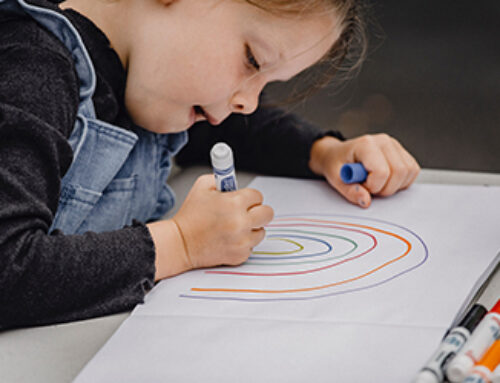Help Your Child De-Stress
Problem behaviors can be challenging to manage, especially when techniques you’ve used before no longer work. When there is a barrier of communication, it feels nearly impossible to resolve the issue and get to the root cause of what is causing a meltdown or tantrum. Keep in mind that your child is also human and just like we have bad days sometimes, they have bad days too. Regardless of which form the problem behavior may present itself, here are some basic generic techniques on how to handle them.

The first one is regulation. If your child is on the floor screaming, crying, and kicking, allow some time for them to let out some of that frustration. When you notice them start to calm, model deep breaths and prompt them to imitate you, then identify or have them identify how they are feeling. Once they’ve done so, reassure them that you’re on their team and want to work towards turning that feeling around. Sensory input also helps to regulate your child and distract them from what they were feeling upset by. Provide squeezes, rub their back, or offer them a hug. If you have tools such as a stress ball or fidget toy, encourage them to utilize it and count to 10. If there is something you know is reinforcing like eating a cookie, playing with a particular toy, or listening to music, bring that up as an option as well.
Help Yourself De-Stress
Stress is a normal part of life. It’s there to remind you that you have deadlines to meet, pressures you to perform in a timely manner, and functions to keep you alert and attuned to what could be a threat or not a threat. On the other hand, too much or chronic stress has been shown to lead to serious health issues. Was there ever a time when you felt like you may have been experiencing too much stress? Your hair started to fall out, you were more curt with your partner or family members, or you experienced loss of appetite, difficulty breathing or difficulty sleeping. We’ve all been there, but it’s important to recognize that some of these side effects are not normal and are actually a sign that you need to start taking steps towards defusing that stress before it becomes a chronic issue.
Dealing with stress can be challenging, especially when you don’t have time to slow down, but finding the proper techniques to deal with stress will be beneficial for your longevity and quality of life in the long run.
Here are two methods on how to de-stress, based on how much time you have available.

One method is to meditate or utilize a guided meditation to deal with stress. Meditation is about being mindful, it’s about focusing your mind on your breathing, taking a step back from the racing thoughts, and being fully present in that moment. A great way to meditate is to find a quiet place, sit or lie down, and allot 5-10 minutes to be in this deep meditative state. Focus on how your body feels, focus on taking deep breaths, and let your mind wander but don’t be judgmental of where your mind takes you. Recognize that there are plenty of things you can and cannot control and tell yourself to let go of the things you cannot control. If there is something you can control, think of how you want to handle it. It’s also always nice to use this time to show gratitude. Think of 2-3 things you are grateful for instead of focusing on the things that are difficult or making you stressed. Gratitude goes a long way and practicing that positive self-talk can simply put you in a better state of mind. One little hack is to hop on YouTube and type in “Guided Meditations for Stress” and there are usually a great deal of helpful, calming videos where you can just plug in your headphones and immerse yourself.

Our second tip is to engage in pleasurable activities every day, whether it’s going for a walk, doing yoga, exercising, going to the beach, spending time with your pet, baking, or cooking something new. What these all have in common is that while there are usually little demands or deadlines that come along with doing these activities, they can all be done at your own leisure. As you are doing these activities, let the activity distract your mind and be present in what you’re using to occupy your time. The thing you’re stressed about will probably still be there when you get back, but make a conscious choice to tell that stressful thing that right now you’re not available. As a result, when you do return to your routine, you may find that you feel a bit more at ease about the situation. The more important part is to realize that you have the ability to control the things you can control, like your reaction to whatever it is that is stressing you,
Lastly, whatever it is that is causing you stress, it’s not going to last forever and you’d be surprised how sometimes life bends itself around and favors that thing you were so worried about. Sometimes it even gets resolved on its own, you get a second chance, or you realize that path wasn’t one you were meant to go down. It’s normal to feel overwhelmed by problem/challenging behaviors, but don’t forget to be kind to yourself!

Blue Bird Day fosters socialization, sensory regulation, and pre-academic learning in children ages 2-7 years in therapeutic rotations that simulate preschool and kindergarten settings. Our compassionate therapists practice a relationship-based and family-centered approach, provide parent training, and collaborate on goals and individualized intensive treatment plans for your child.
We believe in a collaborative and multi-disciplinary team approach to therapy. A team of occupational therapists, speech-language pathologists, dietitians, developmental therapists, behavioral therapists, physical therapists, and therapeutic assistants are created for each child to ensure child and family are fully supported and the best possible results are achieved.
Options for individualized, group and virtual therapy sessions are available as well.
Want to learn more or you have a specific question? Feel free to connect with us here!



